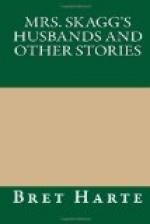The editor then spoke briefly but earnestly. I regret that I cannot recall his exact words, but it appeared that never before, in the history of the “Record,” had the pressure been so great upon its columns. Matters of paramount importance, deeply affecting the material progress of Sierra, questions touching the absolute integrity of Calaveras and Tuolumne as social communities, were even now waiting expression. Weeks, nay, months, must elapse before that pressure would be removed, and the “Record” could grapple with any but the sternest of topics. Again, the editor had noticed with pain the absolute decline of poetry in the foot-hills of the Sierras. Even the works of Byron and Moore attracted no attention in Dutch Flat, and a prejudice seemed to exist against Tennyson in Grass Valley. But the editor was not without hope for the future. In the course of four or five years, when the country was settled,—
“What would be the cost to print this yer?” interrupted Mr. McCorkle, quietly.
“About fifty dollars, as an advertisement,” responded the editor with cheerful alacrity.
Mr. McCorkle placed the sum in the editor’s hand. “Yer see thet’s what I sez to Milt, ‘Milt,’ sez I, ’pay as you go, for you are a borned poet. Hevin no call to write, but doin’ it free and spontaneous like, in course you pays. Thet’s why Mr. Editor never printed your poetry.’”
“What name shall I put to it?” asked the editor.
“Milton.”
It was the first word that the born poet had spoken during the interview, and his voice was so very sweet and musical that the editor looked at him curiously, and wondered if he had a sister.
“Milton; is that all?”
“Thet’s his furst name,” exclaimed Mr. McCorkle.
The editor here suggested that as there had been another poet of that name—
“Milt might be took for him! Thet’s bad,” reflected Mr. McCorkle with simple gravity. “Well, put down his hull name,—Milton Chubbuck.”
The editor made a note of the fact. “I’ll set it up now,” he said. This was also a hint that the interview was ended. The poet and patron, arm in arm, drew towards the door. “In next week’s paper,” said the editor, smilingly, in answer to the childlike look of inquiry in the eyes of the poet, and in another moment they were gone.
The editor was as good as his word. He straight-way betook himself to his case, and, unrolling the manuscript, began his task. The woodpeckers on the roof recommenced theirs, and in a few moments the former sylvan seclusion was restored. There was no sound in the barren, barn-like room but the birds above, and below the click of the composing-rule as the editor marshalled the types into lines in his stick, and arrayed them in solid column on the galley. Whatever might have been his opinion of the copy before him, there was no indication of it in his face, which wore the stolid indifference of his craft. Perhaps this was unfortunate, for as the day wore on and the level rays of the sun began to pierce the adjacent thicket, they sought out and discovered an anxious ambushed figure drawn up beside the editor’s window,—a figure that had sat there motionless for hours. Within, the editor worked on as steadily and impassively as Fate. And without, the born poet of Sierra Flat sat and watched him as waiting its decree.




